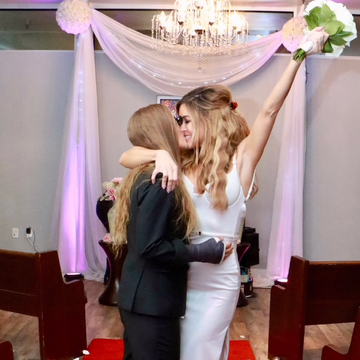Non-committal relationships are so common, it seems like a new Urban Dictionary term for a casual something-or-other is coined every single day. First, there was "booty call." Next: "friends with benefits." And now: "situationship." So what, exactly, does the buzzy term mean?
"A situationship is a romantic arrangement that exists before/without a DTR ['defining the relationship'] conversation," says Los Angeles-based Saba Harouni Lurie, LMFT.
Lurie adds that such a dynamic can be temporary, like after you’ve gone on a few dates with someone, but it’s still too early to discuss relationship status, or it can be the definition of the relationship, "like if you’re in a city on a short-term assignment and start seeing someone casually."
Expanding on that, Jess Carbino, PhD, former sociologist for Tinder and Bumble, stresses that labels can help create meaning and define expectations around relationships. "Situationships can be defined as a romantic relationship that lacks commitment and the associated norms and expectations," she says.
Considering all these labels are (ironically) used to define otherwise label-free relationships, here’s why experts think so-called situationships have become common.
"Online dating apps have created this paradox of choice," says Christie Tcharkhoutian, PhD, LMFT, a senior matchmaker with Three Day Rule in Los Angeles. "We have so many options, it’s hard to commit to that person in front of us because when they go to the bathroom, we can just swipe." (Guilty as charged.)
Sometimes, having undefined relationships is totally cool. It can be fun, sexually satisfying, liberating even. Plus, a situationship "gives you time to get to know somebody without feeling pressured to make a decision," Tcharkhoutian says.
The problem is, more often than not, at least one partner "catches feelings," finds Abby Medcalf, PhD, a relationship expert, author, and speaker in Berkeley, California.
There's an actual physiological reaction that happens when you're intimate with someone. More specifically, the bonding hormone oxytocin gets released when you have sex, cuddle, or even just hug, says Medcalf, and you can't override it. Dang biology.
Once emotions build, being in a situationship can totally blow. "You start to feel rejected because the person doesn’t want you fully," Medcalf says.
So here’s how to tell if you’re actually on that road–and how to pull over before you crash and burn.
The Pros and Cons of Situationships
Let’s examine the benefits and drawbacks of situationships before doing a deep dive into whether your 'ship fits the bill.
Pros
- It’s an opportunity for self-growth. "Individuals may be trying to explore dating and relationships generally and want to learn about how to interact romantically," says Carbino.
- Individuals have freedom to make decisions and explore their passions separate from another person. "In a situationship, you may be more free to prioritize your life without necessarily needing to check in or run things by your significant other the way you might in a more defined relationship," says Harouni Lurie. "Because you're not making a decision to build a life with your situationship partner, the choices you make are yours alone, with a few exceptions regarding choices that could jeopardize someone else's health."
- A situationship allows for intimacy without commitment. "The urge to feel close to and experience intimacy with others is a very human need and, in some instances, it is much healthier for both parties to satisfy that need without feeling like they have to make commitments that aren't aligned with their needs or wants," says Harouni Lurie.
- Situationships can be convenient for certain chapters in people’s lives, notes Carbino. "Individuals may not be capable of a committed relationship at the time," she says. This could be because you know you’re moving soon, are on the mend after a difficult breakup, or countless other reasons.
Cons
- Individuals in a situationship don't get consistent and stable support. "Although we generally have at least one other person in our lives we can confide in or turn to in times of hardship, many of us instinctively feel the need to get that type of support out of our romantic relationships," explains Harouni Lurie. "In a situationship that is already very undefined and lacking clear expectations, it can be hard to feel as though there is space to share those more challenging parts of your life or ask for the type of support you need."
- You’re making yourself emotionally vulnerable. "In a situationship, you may experience some challenging emotions if the situationship is not aligned with your values, or your needs and wants," cautions Harouni Lurie. "Being in an undefined situationship can prompt some individuals to doubt and second guess themselves, and this uncertainty can extend to other areas of life."
- Everything feels so ambiguous. "Situationships can be frustrating because there is ambiguity around what the norms are for the relationship. Therefore, individuals are unable to determine the level of interest or desires of a prospective partner at times," comments Carbino. "Relationships that are not committed may create a great deal of anxiety and uncertainty for those in them."
- There can be buckets o’ conflict. "More often than not, there also are inconsistent views between the individuals in a situationship—both in terms of the relationship and the other person. This may lead to a great deal of conflict, resentment, and anxiety for both individuals, but primarily for the individual who is not pleased that the situationship has not progressed," says Carbino. "Depending on the experiences and inner beliefs the individuals hold about relationships, they may remain in a situationship far longer than otherwise anticipated or desired."
Now, that you've got all the details, get familiar with all the signs that point to you being in a situationship:
1. There’s no natural evolution or growth.
If you’re feeling stuck and that you aren’t hitting milestones in your relationship (first time meeting each other’s friends, celebrating small anniversaries, doing new activities together, etc.), it’s probably time to reality check your relationship—or, erm, lack thereof.
"One of the cardinal signals of a situationship is that the relationship is compartmentalized and the person is not integrated into other social relationships (i.e., friends and family)," says Carbino, adding that the length of the situationship is also key for evaluating whether it has a chance at blossoming into something more. "Longer situationships are often not very promising because it often signifies a lack of desire of at least one party to move the relationship into a different, more committed state," she says.
2. There’s someone else (or multiple others) involved.
Here’s a telling giveaway: "If you discover that your significant other is romantically/sexually involved with one or more other people, you may be in a situationship," says Harouni Lurie. "Even within a couple that actively practices ethical non-monogamy, ideally there would be clear and defined boundaries in place so that all parties stay informed and can consent to the boundaries of the relationship."
Again, with situationships, communication ain’t exactly a strong suit, so you may find out this information from mutual friends, social media, or—eek!—chance encounters around town.
3. You only make short-term or last-minute plans.
People in relationships make plans weeks, months, sometimes years in advance. (I know...mind-blow.) People in situationships may operate on a more hourly and daily timeline.
"You’re in a situationship when you’re not getting invited to meet family, and it’s not a given that you’re going to see each other on the weekend or a holiday," Medcalf says. If all you're getting is last-minute invites, take the hint: Dating you isn't their first priority.
4. There’s no consistency.
One major appeal of a legit relationship is that you can count on seeing and talking to your person regularly. Situationships lack that.
"They’re not asking you to hang out three times a week," Tcharkhoutian says. Or, even if they are one week, don’t expect that to happen the next one.
Another day, another annoying dating trend you can't avoid:
5. They always have the same (vague) excuse.
"Work’s really busy." "I need to hit the gym." "I’m traveling." Sound familiar?
In a situationship, these are excuses. In a relationship, they lead to a plan B: "Let’s celebrate when my presentation is over Thursday." "Want to go for a run?" "I’ll call you from the road."
When you’re in a relationship, you make time for your partner, no matter what other life events are going on, Tcharkhoutian says. But in a situationship, she adds, there’s no urge to problem-solve. (Since that would require, ya know, effort.)
6. You mostly small (and dirty) talk.
Sure, you know where the person lives and works, and maybe a few general deets like where they grew up or if they're a cat or dog person. But let’s be real: You’re more comfortable talking dirty than talking about your fears, insecurities, or lessons from past relationships.
"Without trust, there’s no vulnerability, and without vulnerability, there’s no emotional closeness," Medcalf says. And zilch emotional closeness is what situationships are all about.
7. You don’t talk about the future.
Likewise, conversations in situationships pretty much only involve the present ("What do you want to watch?" "Pizza or Thai?"). The logic here's pretty simple: If you're not in it for the long haul, why talk about it?
If you haven't had a discussion about the future and what you’re looking for, that could be a sign you're in a situationship, Medcalf says.
A situationship is basically "just shared activities—hanging out here and there," Medcalf notes. "It feels directionless."
8. They tell you that they don’t want to get serious.
The easiest way to know you’re in a situationship: The person tells you that you're in one.
"Believe what they say," Medcalf explains. "[People] are not complicated creatures." (And, hey, at least they told you.)
9. They show you they don’t want to get serious.
When in doubt: Open. Your. Eyes. "People will show you through their actions what they think of you," Medcalf says. "If they’re not calling, they’re just not that into you." Some things never change.
10. You’re frequently anxious.
Just because situationships are expectation-free (Want to cancel plans? NBD. Don’t feel like bringing soup when they’re sick? No need!) doesn’t mean they’re stress-free.
"You know you’re in a situationship when you feel anxious because there’s uncertainty, ambiguity, and ambivalence," Medcalf says.
11. You’re getting bored.
Research shows that doing new and different things stimulate the brain’s reward system, flooding it with feel-good chemicals (dopamine and norepinephrine). That neurological reward system just happens to be the same part of the brain that lights up in the early stages of romantic love.
Any relationship expert will tell you that keeping a relationship alive means continuously having novel experiences with your partner. But in a situationship, you probably do the same thing over and over—Netflix and chill—and yes, even that can get old.
"If it’s vague, doesn’t have direction, and doesn’t have any structure, it’s going to be stale, and it’s not going to be fun anymore," Tcharkhoutian confirms.
Okay, so you're definitely in a situationship. What now?
If you’re cool with what you have and want to keep it that way, first ask yourself: Am I really?
"In some ways, we might be okay with a casual situation, but we might also be thinking, 'If this is what they need, that’s fine; I can accommodate that,'" Tcharkhoutian says.
Make sure you’re not pushing your own needs and wants aside just because you want to satisfy someone else's. (Or because you think their feelings might change...they may never.)
If you’re truly down with the sitch, set some boundaries. Are you going to talk about who else you're both sleeping with? Are you going to do weekday overnights? Are you going to hang just the two of you or with each other's friends? "Be clear you’re both on the exact same page with the same expectations," advises Medcalf.
And if you actually want more, speak up. Say: "I’ve enjoyed spending time with you," suggests Tcharkhoutian. Then tell them what you like or appreciate about them, and finally ask for their thoughts on where things might go.
If they come up with an excuse for the casual scenario without an end date—"Work is crazy" instead of "After my real estate exam, I should be able to commit more"—don’t expect things to change.
Either way, "go in with a really clear boundary of what you will and won’t accept," Medcalf says. "You call the shots."
Yep, you heard me: You are in control of this 'ship.
Anna Medaris Miller is a writer and editor in New York City who has years of experience reporting and writing on various health topics. She's covered the upsides of sugar consumption and the downsides of standing desks, but because she made her national TV debut explaining why toilet seat covers are useless, she'll forever identify with "the bowel beat." Public swimming pools, brewpub patios, and basset hound festivals are her happy places.
Perri is a New York City-born and -based writer; she holds a bachelor’s in psychology from Columbia University and is also a culinary school graduate of the plant-based Natural Gourmet Institute, which is now the Natural Gourmet Center at the Institute of Culinary Education. Her work has appeared in the New York Post, Men's Journal, Rolling Stone, Oprah Daily, Insider.com, Architectural Digest, Southern Living, and more. She's probably seen Dave Matthews Band in your hometown, and she'll never turn down a bloody mary. Learn more at VeganWhenSober.com.













